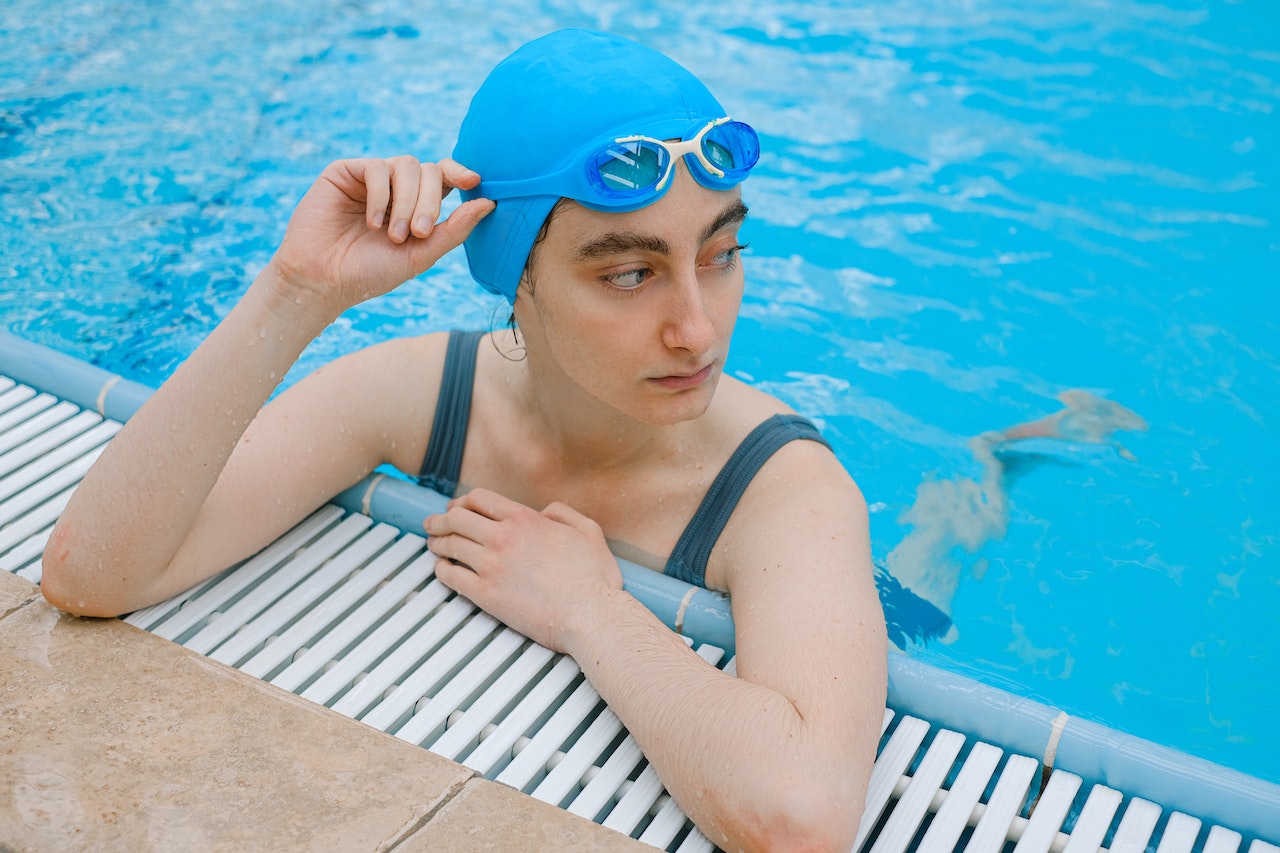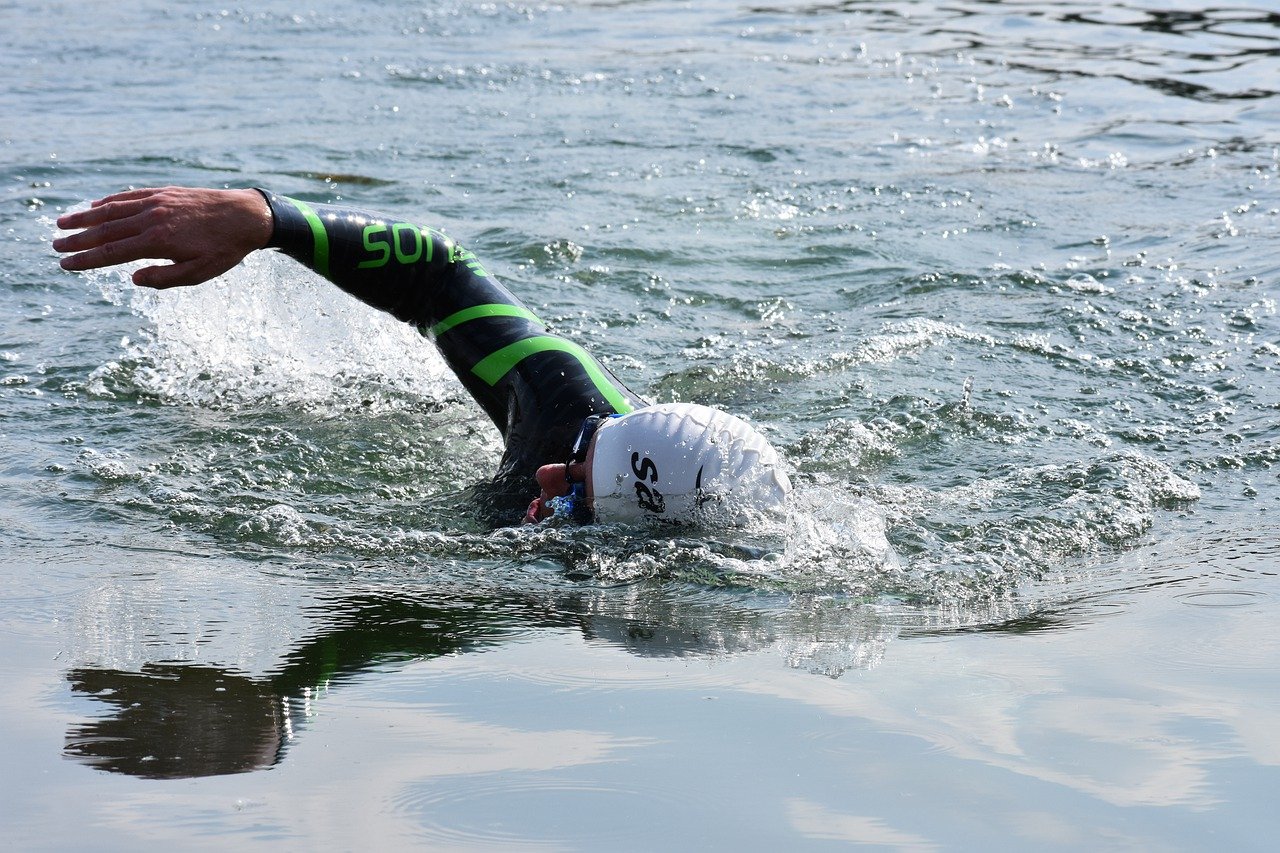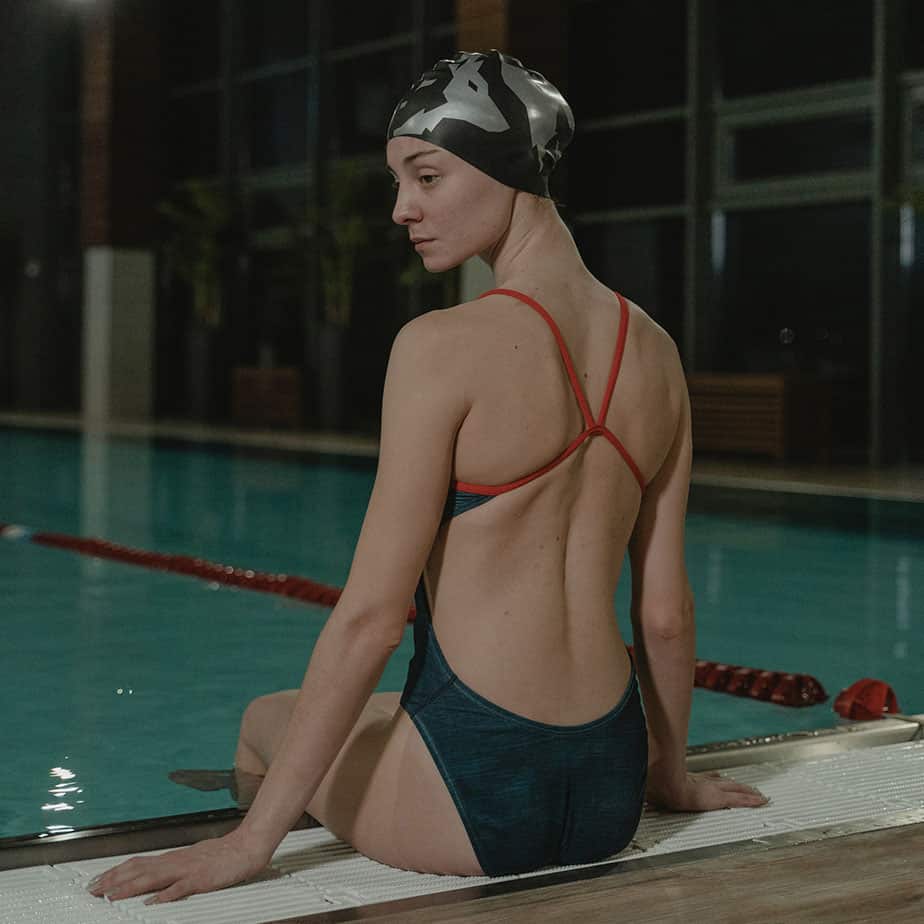My friend, if swimming caps don’t work, then why does every single competitive swimmer wear one during competitions? They aren’t wearing it for fun, I can tell you that; there are good and practical reasons to do so.
A swimming cap’s primary purpose is to streamline a swimmer’s head shape which reduces drag and ultimately helps them swim faster. In that respect, the longer your hair is, the more of a speed increase you will experience. Most people aren’t willing to shave their head bald, so they resort to wearing a swim cap to give themselves as much of an advantage as they can.
But a swim cap can do so much more than just reduce your drag. You may have heard that they can protect your hair, possibly even keep it dry, as well as keep your head warm and keep hair out of the pool filters. Can a piece of rubber worn over your head really provide all of these benefits?
Indeed, swimming caps are very effective at what they do. In addition to the speed improvements, they also lead to a reduction in lactic acid buildup, they can limit how much damage chlorine and saltwater does to your hair by limiting your hair’s exposure to them, they collect every strand of head hair you shed and keep them from clogging the pool, they keep your head warm if you’re swimming outdoors, and they can reduce the chances of getting swimmer’s ear by keeping water out. Swimming caps work very well.
If you want to know the specifics, keep reading on as we go over each point in more detail.
Do swimming caps make you faster?

Many swimmers subjectively feel like they swim faster after putting on a swim cap, but the question is: are you actually faster or is it just in the mind, and if you are faster, by how much?
Thankfully, we don’t have to just rely on anecdotes. There have been multiple studies which confirm the speed improvements that wearing a swim cap provides.
In a similar vein, there have been multiple studies that confirm that shaving your body hair also improves your speed. In other words, streamlining your body by shaving off your hair or covering it up leads to noticeable decreases in underwater drag.
Let’s put some numbers to these claims. It was found that in a 25-yard freestyle sprint, swimmers wearing silicone swim caps (the competition standard) had a 0.29 second increase in speed compared to when the same swimmer was not wearing a swim cap. 25 yards is a fairly short distance, but imagine how many seconds it could improve your time by over a longer event.
It was also found that wearing a swim cap led to a decrease in lactic acid in a swimmer’s muscles over a set distance compared to the control group. This can be explained as a swim cap has improved a swimmer’s hydrodynamics – they experience less drag since their hair is covered up, so each stroke allows them to propel themselves slightly further than if they didn’t wear a cap.
Thus, it takes a swimmer less strokes to cover the same distance, meaning they have not strained their muscles as much and have less lactic acid buildup. This energy conservation is crucial to help give swimmers that last burst of speed to edge out a win.
Another factor to consider is the psychological benefit that shaving provides. These studies also found that if a swimmer feels like they are faster, then that results in a noticeable improvement in their performance. Thankfully, swim caps objectively do make one faster, but even if that were not the case, the psychological benefits alone have a positive impact on a swimmer’s morale and motivation.
Are swimming caps waterproof?

Sadly, swim caps are not waterproof but they can keep your hair drier than any other option. However, their primary purpose is not to keep your hair dry, so don’t think your cap is faulty just because your hair gets a little damp.
There are a few things to consider here. Is the swim cap the appropriate size for your head? What material is the swim cap made of? How are you wearing the cap on your head?
With regards to size, a swim cap should fit snug on your head without restricting blood flow or causing pain. If you have long hair, you will need a bigger swim cap designed for long hair.
With regards to material, out of the three most popular swim cap materials – silicone, latex, and lycra – only silicone is thick enough not to let water through it. That’s also partially why it decreases drag the most out of the three materials.
Lastly, are you wearing your swim cap such that your goggles are underneath it and you are partially covering your ears? Anything that prevents the swim cap from sealing directly on your skin, even small strands of hair, can create a small gap that allows water to seep in.
If you want to keep your hair as dry as possible, you will need to seal these gaps. You can try wearing a waterproof headband first to create a new smooth layer for your swim cap to seal on, then wear the swim cap over it. You can also try sealing any gaps by applying Vaseline around them.
Do swimming caps protect your hair?

Yes, swimming caps protect your hair (and scalp) from the harmful effects of chlorine, saltwater, and UV rays. As mentioned, swim caps can limit the amount of water that your hair is exposed to despite it not being completely waterproof.
The best way to do this is by wearing a silicone swim cap, tying your hair up in a bun if it’s long, and wearing it over your ears to seal as many gaps as possible.
Some water can still seep in from the occasional gap, but you’ll find that only the sides of your hair gets a little damp, and the top of your head avoids exposure to chlorine and saltwater.
If you’re swimming outdoors, you need to worry about UV rays as well. In addition to burning your scalp, UV rays can also cause damage to your hair by making it brittle. Swim caps, like your swimsuit or wetsuit, have a UPF rating meaning it will block the majority of the UV rays from even reaching your scalp and hair.
Do swimming caps keep water out of your ears?

If you are wearing the swim cap over your ears, then yes, they can keep water out of your ears. However, this is not entirely waterproof, but thankfully you can combine this with wearing swimming ear plugs underneath. That way, if either one is not completely effective on their own, both worn together is more than enough.
The downside of this is that it can be difficult to hear what’s going on around you. Everything will sound muffled, even if you are only wearing one or the other. Both together may block out the sounds so much that you can’t hear people if they are calling you. This is not recommended if you are swimming outdoors.
Do swimming caps keep you warm?

Depending on the material of your swimming cap, yes, it can keep your head warm. Silicone and neoprene swim caps are thick, durable, and do not allow water to pass through them. They are great at insulating the heat your head generates and keeps it from getting conducted away by the cold water.
Neoprene is the same material that wetsuits are made of. And just like the wetsuit, the goal is not to keep you dry, but to keep you warm in spite of the fact that you’re wet. Any water that makes its way under the neoprene will simply get warmed up by the trapped heat so you do not feel cold.
For open water swimming, a thick neoprene swim cap is a must. For indoor swimming, wearing a silicone or neoprene swim cap may cause you to overheat if you wear them for too long. Latex and lycra swim caps allow water to pass through them and will feel more comfortable to wear without overheating you.
Do you need a swim cap?

After reading about all of these benefits that swimming caps provide you, and confirming that they do indeed work very well, should a recreational swimmer wear a swim cap? If you are a competitive swimmer, the answer is unequivocally yes, but a more casual swimmer might not care enough to wear one.
Swimming pools’ dress codes generally don’t require you to wear a swim cap, so you aren’t forced to wear one. However, pool staff would really appreciate it since it prevents hair from shedding into the pool and clogging the pool filters.
However, even as a casual swimmer, consider your own needs. Do you hate having dry and brittle hair? Do you want to swim faster just because it’s fun? Do you hate getting water in your ears, or contributing to the debris that floats along the surface of the pool? If you go swimming often, I’d say a swim cap is an essential piece of gear in any swimmer’s kit. They work and are very effective, so consider wearing a swim cap next time you go swimming.

